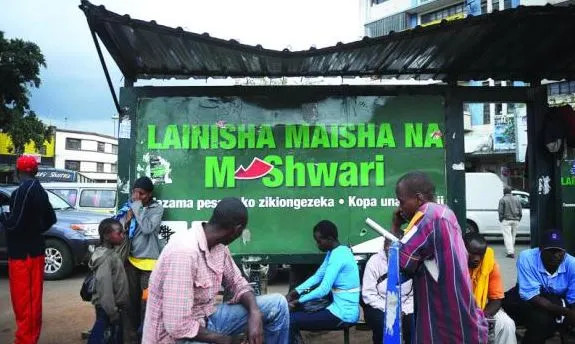Business
SAFARICOM’S M-SHWARI MELTDOWN: TERRIFIED KENYANS FLEE AS BILLIONS VANISH INTO DIGITAL BLACK HOLE
For a nation that has staked its economic future on mobile banking, the M-Shwari catastrophe is a brutal wake-up call.

A catastrophic system failure at Safaricom has triggered mass hysteria across Kenya, with thousands of panicked customers staging a digital bank run after their life savings mysteriously disappeared from M-Shwari accounts for three terrifying days.
The nightmare began Thursday evening, October 30, when the entire M-Shwari platform collapsed without warning, instantly locking millions of Kenyans out of their money.
Frantic users watched helplessly as their account balances vanished into thin air, error messages replaced their savings, and Kenya’s most trusted mobile banking service transformed into a financial house of horrors.
For 72 excruciating hours, desperate customers were cut off from their own money. No withdrawals. No deposits. No loans. No answers. Just silence from Safaricom as panic spread like wildfire through a nation where mobile money has become oxygen for economic survival.
The human cost was immediate and brutal. Commuters were stranded without fare. Emergency medical bills went unpaid.
Families couldn’t buy food. And all the while, social media exploded with terrified speculation that their money had been stolen, hacked, or simply evaporated.
“I’m I the only one experiencing M-Shwari crisis, ama tuko wengi?” Shen Ken pleaded on X, posting screenshots that captured the horror millions were experiencing. Lameck Kemosi narrowly escaped being thrown off a matatu when M-Shwari failed him at the worst possible moment. “Kidogo nitupwe nje ya gari juu yenu leo,” he raged. “You didn’t even issue a notice. You are becoming unreliable!”
The rage was justified. Safaricom, the telecommunications colossus that controls Kenya’s digital lifeline, had allowed its cornerstone product to collapse without so much as a warning text message.
Millions were left in the dark, quite literally unable to see if their savings still existed.
When Safaricom finally broke its silence, the response was clinical and maddeningly vague: “The M-Shwari service is currently unavailable. We are working earnestly to resolve this technical issue.” No explanation of what went wrong. No timeline for restoration. No acknowledgment of the chaos engulfing the nation.
By Saturday, Safaricom declared victory, announcing the system had been “resolved.” Customer service representatives flooded social media with robotic reassurances that funds were “safe” and the crisis was merely an “access issue.” But the damage was done.
The moment services flickered back to life, a stampede began.
Users who had spent three days fearing their money was gone forever weren’t waiting around for the next catastrophe.
They withdrew everything, draining their M-Shwari accounts in a mass exodus that speaks volumes about shattered trust.
This disaster comes on the heels of a string of digital banking horror stories that have left Kenyans wondering if their money is safe anywhere.
Earlier this year, KCB M-Pesa users were blindsided by faulty reversals.
In September, a woman claimed KSh 55,000 vanished from her M-Shwari account, and instead of getting her money back, she reportedly received threats from Safaricom.
Industry experts are sounding the alarm. Kenya has bet everything on mobile money, with over 80 percent of adults dependent on platforms like M-Pesa and M-Shwari for survival. When these systems fail, the entire economy seizes up within hours. When they fail without warning or explanation, trust evaporates overnight.
Safaricom now faces a reckoning.
The company’s stranglehold on Kenya’s mobile money market has made it too big to fail, but this week proved it’s also too fragile to trust. Customers are demanding answers: What caused the meltdown? How many people were affected? What safeguards exist to prevent the next disaster? And why should anyone believe their promises when the entire system can collapse without warning?
The company has pledged to reconcile pending transactions, but promises ring hollow when millions have just witnessed their digital fortress turn into quicksand.
For a nation that has staked its economic future on mobile banking, the M-Shwari catastrophe is a brutal wake-up call.
The convenience that revolutionized Kenya’s economy can vanish in an instant, and when it does, Safaricom’s assurances that “your money is safe” sound less like comfort and more like a prayer.
Kenya Insights allows guest blogging, if you want to be published on Kenya’s most authoritative and accurate blog, have an expose, news TIPS, story angles, human interest stories, drop us an email on [email protected] or via Telegram
-

 Grapevine2 weeks ago
Grapevine2 weeks agoRussian Man’s Secret Sex Recordings Ignite Fury as Questions Mount Over Consent and Easy Pick-Ups in Nairobi
-

 News1 week ago
News1 week agoTHE FIRM IN THE DOCK: How Kaplan and Stratton Became the Most Scrutinised Law Firm in Kenya
-

 Investigations1 week ago
Investigations1 week agoMulti-Million Dollar Fraud: Three Kenyans Face US Extradition in Massive Cybercrime Conspiracy
-

 Economy1 week ago
Economy1 week agoIran Demands Arrest, Prosecution Of Kenya’s Cup of Joe Director Director Over Sh2.6 Billion Tea Fraud
-

 Business1 week ago
Business1 week agoA Farm in Kenya’s Rift Valley Ignites a National Reckoning With Israeli Investment
-

 Africa2 weeks ago
Africa2 weeks agoFBI Investigates Congresswoman Ilhan Omar’s Husband’s Sh3.8 Billion Businesses in Kenya, Somalia and Dubai
-

 Grapevine4 days ago
Grapevine4 days agoA UN Director Based in Nairobi Was Deep in an Intimate Friendship With Epstein — He Even Sent Her a Sex Toy
-

 Politics2 weeks ago
Politics2 weeks agoSifuna, Babu Owino Are Uhuru’s Project, Orengo Is Opportunist, Inconsequential in Kenyan Politics, Miguna Says

















